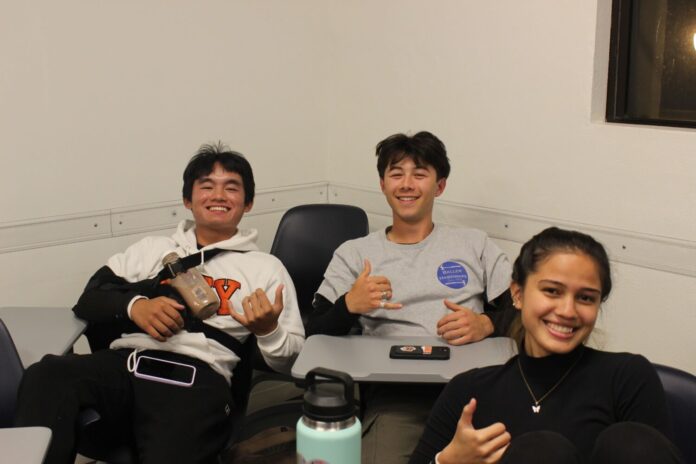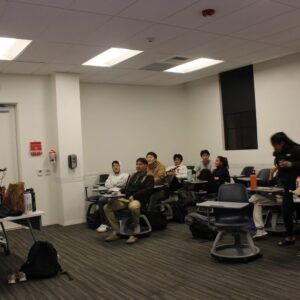
At the first general meeting of the Hawaiʻi Club this semester, about 20 members were present with a box of snacks to share and a plan to play Jeopardy – Hawaiʻi Edition! Teams of four huddled together to pool their knowledge about the state and competed to see who could answer the most trivia about Hawaiʻi, ranging from questions about menu items at popular Hawaiian restaurants to questions about the Hawaiian alphabet while Hawaiian music played in the background.
Carly Venenciano (sophomore), one of the club’s co-presidents, said that the main goal of the club right now is to start building a community aimed towards the people from Hawaiʻi but also to bring friends in and share their culture.
“We have a pretty decent population of people from Hawaiʻi at Occidental,” Venenciano said. “I think a lot of us experienced culture shock coming here, so it’s nice to find people who can relate to that.”
Koko Butcher (sophomore), a class representative for the club, said there is a comfort in being around other people from Hawaiʻi.
“In Hawaiʻi, everything is really slow-paced,” Butcher said. “We seriously just eat good food and go to the beach, and it’s nice to talk to people who are on the same vibe.”
Venenciano, Butcher and Paige Villanueva (junior) all said that at general meetings they often slip into their Hawaiian accents and use slang they don’t normally use with other Occidental students.
“I find myself speaking more Pidgin,” Butcher said. “Everyone back home talks Pidgin, and I find myself doing it at these meetings but I never speak Pidgin to anyone else because nobody understands what you’re saying.”
Pidgin is a Creole language spoken in Hawaiʻi that is mostly mutually intelligible with English and is often used in everyday conversation. According to Butcher, the Pidgin dialect arose from immigrants in Hawaiʻi combining languages in order to speak to each other.

Villanueva said many of the members of Hawaiʻi Club are from Oahu — which they have in common with former Occidental student President Barack Obama.
“The majority of us went to the same high school, okina ‘Iolani School in Honolulu,” Villanueva said. “So it’s nice getting to know others who we didn’t know before.”
Venenciano said this year the club is being restarted after a transition of power from the graduated Executive Board members to the current six-person leadership team. Additionally, Venenciano said the Hawaiʻi Club is planning on bringing back events such as the annual luau that haven’t been held in recent years due to the pandemic.
“The luau is the biggest thing we all want to make happen this year, especially for the seniors who are going to graduate who have never had one,” Venenciano said. “They would set up in the quad. I think people came for the food, and there were at least 100 people.”
At the general meeting, Hawaiʻi Club members discussed how to encourage Occidental students to attend and if they should have dance performances such as the ones included at the past luaus.
Other activities that are being planned by the Hawaiʻi Club include a lei-making workshop and joining a scavenger hunt competition for Hawaiʻi Clubs at colleges across California. Additionally, the Hawai’i Club at Loyola Marymount University is hosting a concert for Common Kings, a popular reggae band in Hawaiʻi, and has extended an invitation to the Hawaiʻi Club at Occidental to attend the event.
“In the future, maybe not in our time, it would be cool to put on an event with other schools,” Butcher said.
According to Venenciano, a goal for the future of the Hawaiʻi Club is to get it back to what it once was — an organization that used to have bigger events. Venenciano said that hosting an artist like Common Kings is an amazing accomplishment for a Hawaiʻi Club and something that would be an incredible opportunity in the future.
“I think the main goal though is to make sure there is that community for more Hawaiʻi kids who end up coming to Oxy,” Venenciano said.
![]()






























